Introduction
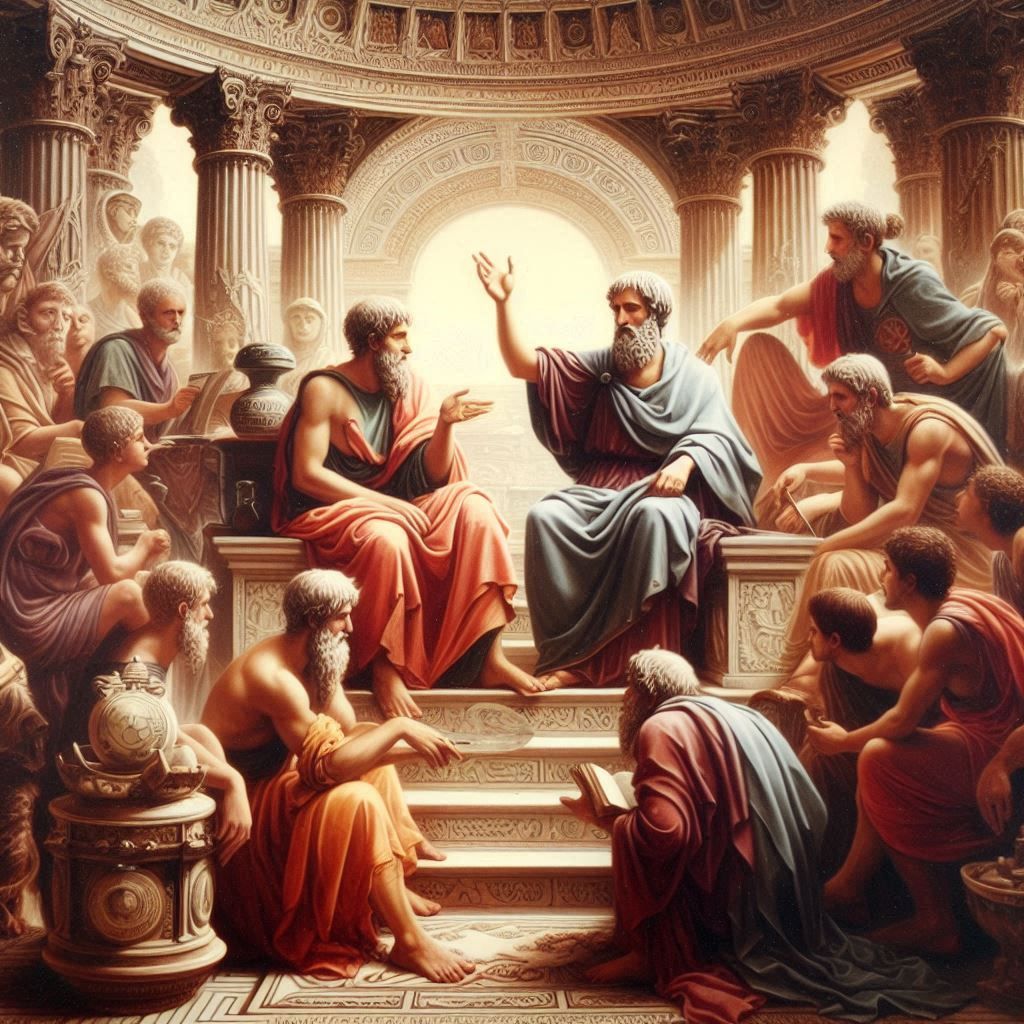
In Athens,Plato,the head of Academia, probably paid little attention to the enrollment in his institution of a seventeen years old youth prodigy, Aristotle,who had recently arrived from Macedonia.
When Aristotle joined Plato’s Academy instead of Isocrates’,the train of events,that closely linked the lives and philosophy of three of the greatest thinkers the world has ever known was complete.Although,the great Macedonian, disagreed on many points with Socrates and Plato,the area of agreement was astonishingly large. Aristotle developed a political theory that advocated the constitutionalism and the rule of law,which was quite akin to the Athenian democratic ideal.
Aristotle was born in Stagira in 384 B.C to parents of Ionian origin.His father was a well known physician and was ultimately appointed to the court of Phillip II.The great Macedonian’s interest in biological sciences largely stemmed from his father’s occupation.
When Aristotle came to Athens,the Athenian city-state was recovering its vitality and spirit after a period of depression following its defeat by Sparta in the Peloponnesian war. Contrary to Plato’s admiration for Spartan military state, Aristotle liked the more liberal culture of Athenian city-state.He left Academia at 37.At the age of forty,he married the niece of Hermias the ruler of Atarneus.Soon after, Aristotle was appointed by Phillip of Macedon, the mentor to his illustrious son Alexander.This association lasted for many years.
In 335 B.C, Aristotle returned to Athens to establish his own school,The Lyceum. The institution flourished and Aristotle was immensely popular teacher.In 323 B.C, Alexander died and as a consequence there were uprisings in Greece.In Athens,great hatred was immediately directed toward Aristotle because of his connection with the great conquerer.Aristotle left the city and took refuge in Chalcis where he died the following year.
To read Plato’s Political Philosophy Click Here.
To read Football articles Click Here.
To read Cricket Articles Click Here.
Aristotle’s Scientific Method
No account of the political ideas of Aristotle is complete without some reference to his method.He was arguably the first-known proper Political Scientist. Although Aristotle agreed with Plato’s idea of Philosopher Kings in an ideal state,but he implemented a much more pragmatic approach. Aristotle argued that since man is unable to incorporate all the components of justice in his own community,a scholar must strive to establish the best practicable state, which does not demand more virtue and ability than men actually possess.
According to Aristotle,the main concern of a philosopher must be to reform the existing state rather than the construction of a new state, perfect or imperfect. Both Plato and Aristotle agreed that is indispensable to man.Any state perfect or imperfect is better than none at all.Anarchy, would drag men down to an animal-like existence. Aristotle even preferred tyrannous state to chaos.
In both Natural and Social sciences, Aristotle favored the evolutionary view of the scientific inquiry.He advises the students to examine the process;in studying the states he must consider the historic process.Through this historic process, Aristotle developed a great respect for custom and tradition.To him,custom and tradition had merit because they functioned.They may seem illogical but if there were no reason behind these traits,they would not have evolved initially and they shouldn’t be abandoned easily.
The origin and Purpose of State in Aristotle’s Philosophy
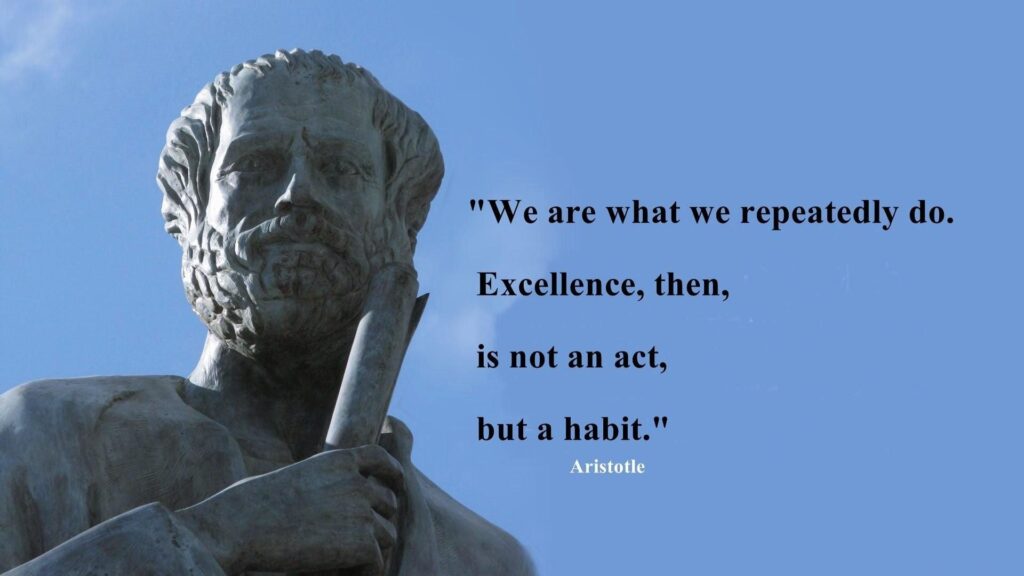
Aristotle argues that man is a sociable creature and he would farm a state even if he foresaw no advantages.He persists that state has many material and moral benefits.Man always seeks the good.He strives for justice and moral perfection.Man is the only animal endowed with the ability to reason and to communicate.
These capabilities alone do not suffice to enable man to pursue the ends of justice and moral perfection.If he lives alone and spends most of his time for the satisfaction of physical needs,he will make no progress.The path of progress leading to human improvement can be negotiated only with the assistance of organization.The organization evolves from the family to the village and ultimately to the state.The state is the highest organization of the community through which man strives for moral perfection.
Aristotle insists that although state is an organization created by man for his own benefit,it is also a natural institution.It represents the culmination of the institutional development. Outside the state man is a worthless beast.
To clarify this vital ingredient of his philosophy, Aristotle uses the analogy of the flower seed.The seed is the less representative of the true nature of species than is the flower in full bloom.Yet it precedes the flower.Thus the state is more natural than the precedent individual, family or village.The state is the natural home that human beings have found in the culminating phase of his drive toward moral perfection.
In this typically greek theory of development, Aristotle emphasizes that the state is not a mere instrument,it is a community,that requires rules of order and laws to manage its citizens.But in this state people are held together by the bonds of community and fellowship more tightly than by laws.
Aristotle’s Various Forms of State
The ideal state of Aristotle is the one that perfectly accomplishes the task of achieving moral perfection in its citizens.But he recognizes that such a Utopia is impractical.The measure of the goodness or justness of a state is its capacity to serve the general interest.
The constitutions which consider the common interest are right constitutions.Those constitutions which consider only the personal interest of the rulers are all the wrong constitutions.Here Aristotle defines the constitution.A constitution is the basic law determining the allocation of power within the state,as well as the distribution of rights and rewards.
Justice,the end sought by the art of politics,will be achieved if rewards are distributed and if power is exerted on the basis of contributions made to the community. Justice, Aristotle contends,does not consist in a enforced equality in the holding of public office.Nor does it means that office shall go to those who possess wealth.Rather,”claims to political rights must be based on the ground of contribution to the elements which constitute the being of the state.
Aristotle’s three most desirable forms of state are Monarchy, Aristocracy and Polity (Moderate Democracy) respectively.each of these three has its pervert sibling ,Tyranny, Oligarchy and extreme Democracy.
Monarchy,the rule by the virtuous man, is the best of right constitutions.
Tyranny,rule by the selfish man, is the worst of the perverted forms.
Aristocracy,the rule by virtuous few,is the second best of the good forms.
Oligarchy,the rule by a few selfish wealthy,is the second worst of the perversions.
Polity(Democracy),the government by the people and for the people, is the poorest of the good.
Extreme Democracy,mob rule,is the best of the worst.
This classification is similar to the one Plato mentioned in the Statesman.Perhaps because of his close association with Hermias and Alexander, Aristotle preferred Monarchy as the best form of government.
Aristotle’s Monarch must possess the qualities of Plato’s Philosopher King.As he knows that no perfect man or woman exists, Aristotle emphasizes upon constitutionalism and the rule of law and no one even the Monarch is not above the law. After minutely observing the existing monarchical systems, Aristotle realizes that rule by one man is mostly selfish and unrestrained by law.
Then,one question arises,who should rule?Plato said that the virtuous should rule. Aristotle asks,how may the virtuous be found?Virtue may even mean equality but what is equality?Is it to give all men an equal vote irrespective of birth, education or property? Aristotle denies the claims of radical democrats that all men are entitled to an equal share of power, because all men have different capacities and make different contributions.The conclusion at which Aristotle arrives is that since no class has a right to be a sovereign,the position of the sovereignty must be accorded to the law.
Aristotle’s View of Slavery
Aristotle argues that slavery is a natural institution and it is justified in a situation where slave is inferior to the master.The main criterion for master’s superiority is his capacity to employ reason.Aristotle says that some men differ from one another “as much as body differs from the soul”or “as much as man differs from the lower animals.”
According to Aristotle,there are the obvious differences between those whose natural ability limits them to service and those whose ability entitles them to such service.Those who serve are are natural slaves;it is beneficial to them to be ruled.
A man is a slave by nature,if he is “capable of becoming the property of another.Physical distinctions also separate master and slave.The latter is capable of performing only the menial duties,the former can serve in the military and hold public office.
Aristotle Mentions the Duties of a Ruler
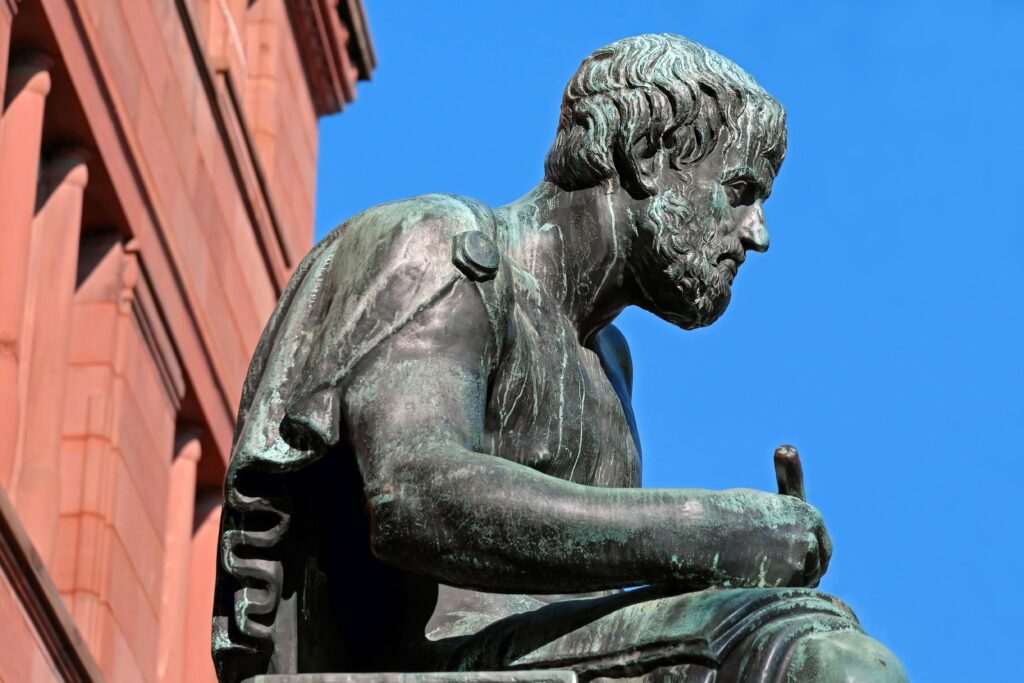
The ruler or statesman must study the ideal constitution.He must know what kind of constitution is practicable in a given set of circumstances, realizing that the situation in not going to be ideal,he must study a constitution which is neither ideal nor even the best practicable and understand how to preserve it and he must determine the best components of the best practicable average constitution for all states.
Aristotle admits that it is difficult to persuade citizens to accept a new constitution and almost equally difficult to obtain consent for the reform of an existing constitution.The good statesman must know what kind of laws are appropriate to each of the various kinds of constitutions and laws must accord with the constitution.
Aristotle contends that in the practical world,states are predominantly either oligarchic or democratic,and the statesman must possess the ability to deal with these two forms.A number of social, political and economic factors predispose a state toward one or another or a combination of these forms. Oligarchic or Democratic structure of a state depends upon the distribution of wealth,size,relative strength and disposition of classes and other such factors.A statesman must accustom himself to dealing with these complicated problems.
For example,democracy is of various kinds,from moderate to extreme.According to Aristotle,the worst democracy is the one where property qualification is entirely absent and people are paid for their participation,as in the popular courts of Athens.Because it affords too much power in the hands of urban Proletariat,who use this power in a restrained manner to benefit themselves at the expense of the civilized, intelligent and industrious citizens.
The best form of democracy is mainly made up of farmers,who have busied themselves on their lands and permit adequately trained professionals to conduct public affairs for them.Here,the ultimate power resides with the people,but they will not use it untill the administrators’ corrupt practices make such action necessary.What Aristotle has in mind is a representative,rather than a direct democracy.
Aristotle argues that Oligarchies are also of many types.The degree of concentration of property and the consequent restrictiveness of the property qualification required for voting and holding public office determine the goodness and badness of an Oligarchy.If property ownership and consequent political power is not too concentrated and a sufficient number of property owners hold political power if the oligarchy does not abuse its privileges,a law-abiding state is a possibility.The danger with the oligarchic form of government is that it may become too oligarchic and the concentration of power becoming progressively greater until only a few rule,will create animosity among the masses.
To conclude,the possibility of failure of either the democratic or oligarchic form stems from the danger of either form being too much itself,from carrying either principle to the extreme.
Aristotle’s Best Practicable State
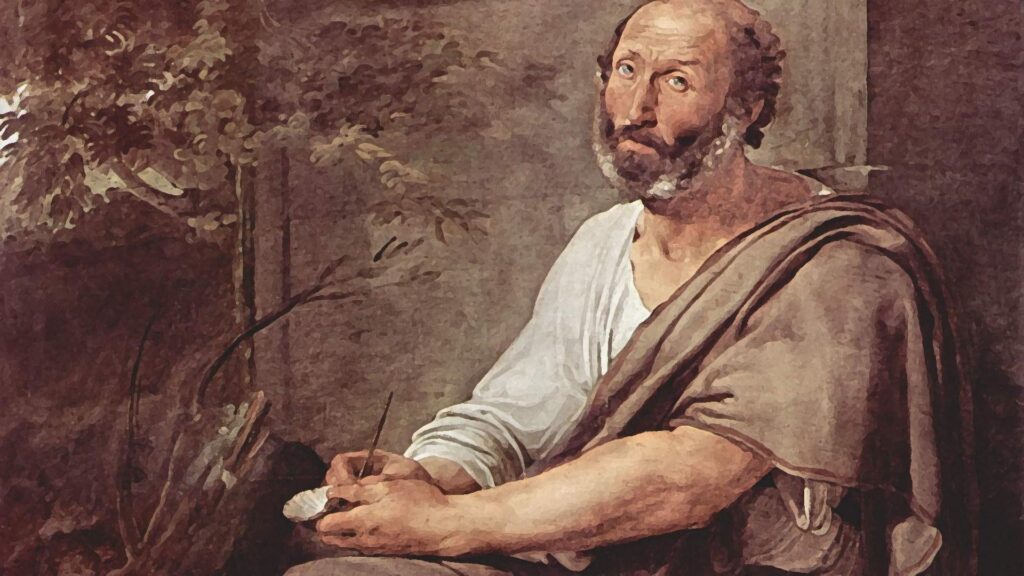
After deeply analyzing democratic and oligarchic states, Aristotle has made up his mind that the best practicable state must be an amalgamation of Democratic and Oligarchic principles.According to the great Macedonian,there are two competing forces in any society: quantity and quality.Quality means wealth,birth,social position and education.These are Oligarchic features of the community.By quantity is understood numbers,the claims of the mass of the people,the democratic forces.A state dominated completely by either force would be unlawful, unstable and selfish.The best practicable way is to balance each force against the other,so as to drive out the worst features of each and achieve the much-desired stability.
There are three classes in every state,the rich,the poor and the middle-class.The last one is the most logical candidate for power. Because the rich have too many advantages and are unwilling to accept discipline.The poor have too few resources and lack spirit.The rich always commands and the poor always obeys.The rich are mostly preoccupied with the lust of property and wealth and the poor are always jealous of the property of the few.
The middle-class is the most reasonable.They are not so poor to be humiliated,nor so rich as to become factious.Both Plato and Aristotle recognized the destructive potential of the property question.The former’s solution was to altogether abolish private property for the ruling class,and the latter advises that the property must be distributed equitably enough so that the dispute over its possession is greatly diminished.
Aristotle’s best practicable state is the mixture of Oligarchy and Democracy.These contending forces balance each other in the practicable state.This state is based on a mixed constitution,that rests upon the principle of balance of the forces of Oligarchy and Democracy.It is the middle-class that will provide the ideal balance.This class consists of sober,industrious folk,whose primary concern is with the ordinary pursuits of life but who, nevertheless,keep a wary eye on those who administer the affairs of state.
Aristotle’s Criticism of Ideal States
Aristotle’s criticism of ideal states should be studied for its positive rather than negative aspects. Because his criticism of the ideal states contains constructive suggestions.Aristotle condemns Plato’s advocation of Communism in his ideal state.Plato’s purpose of adopting the Communism is to achieve unity because he thinks that unity is a productive element for a state.Aristotle denies this argument on the basis that the unity of the kind advocated by Plato is applicable to a family rather than a Polis.Thus Communism will not produce that unity which Plato values so highly.In a system where all men must feel a responsibility for all children, no man would feel responsible for any child.
Aristotle is also a severe critic of property rights in Plato’s ideal state.He asserts that the right to own property is the fundamental part of human nature.It is difficult for men to work in almost any kind of mutual endeavor and doubly difficult where mutuality of property is involved.The more productive men will always want more than the less productive ones.Thus faction would arise.
Aristotle also argues that a man feels’also,a natural satisfaction in calling something as his own.Everyone must acquire the property according to his needs,not much,not less than that. Aristotle says that it is a grave error to attribute the problems of the world to the institution of private property.These troubles are due to the evils of human nature and communism will not end them.Aristotle considers private property the basic requisite for a better social and political life.
Another point of contention between Aristotle and Plato is the latter advocacy of the rule of the elite and his complete disregard of the rule of the law.Aristotle asserts that despotism means the loss to the citizen of the individual freedom and dignity.Where the law is supreme,men can be ruled by their own consent.The rule of the law permits the experience of the ages and wisdom of the people to play a role.Men in the mass produce a knowledge superior to that of a single law giver,even though he be of the wisest variety.
Plato also rejected the custom as unnecessary heresy.On the other hand, Aristotle considered it an integral part of the law.Plato’s substitution of the intelligence of the Philosopher King for the sovereignty of law is regarded as frivolous by Aristotle.Defects in law and government will always be found,they should best be left alone if correcting them involves too much tempering.The benefit of the change will be less that the loss which is likely to result if men fell into the habit of disobeying the government.
The teacher and pupil disagreed on many points but not on all.Both believed that the existence of a state is of the utmost importance for a good life.Both agreed that reason and science are the vital tools for the statesman to use in developing the state.Both sought justice but each found it in different place.Plato found it in the rule of Philosopher Kings and Aristotle in the rule of law.
Aristotle’s Ideal State
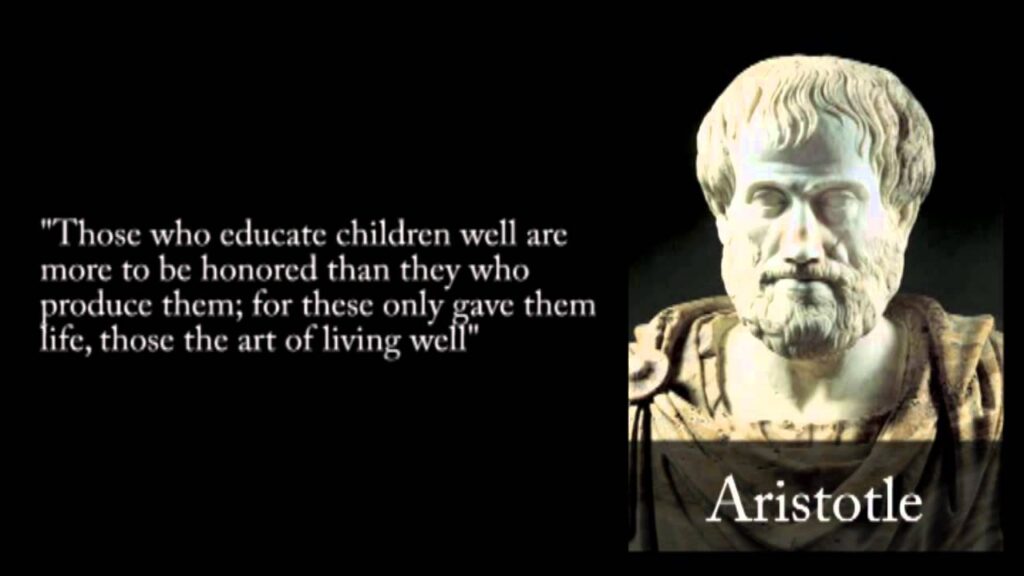
Aristotle’s ideal state is quite different from the one advocated by Plato in The Republic.Knowing that the ideal state is unattainable, Aristotle formulates the ideal of the good state rather than the unachievable Platonic Utopia.
Aristotle emphasizes that the purpose of the state should conform to its citizens’ well being and state’s constitution must reflect the good life of the individual.The threefold ingredient of the good life are External Goods,Good of the Body, and Goods of the soul.Excessiveness of external goods by which Aristotle means material possession, corrupts the soul. Same may be said of the goods of the body.It is the goods of the soul that are the most essential, and they must be the true end of human concern.The usefulness of everything also depends upon how well it contributes to that end.The good state inculcates morality among its citizens and subordinates material things to that end.
The good state is always concerned peace and internal improvement rather than occupying the lands of its neighbor states. Although sufficient military power will be maintained for defending its territory.
In terms of the ideal size of a state, Aristotle argues that a too large state will find it difficult to enforce the law.If it is too small,the state will not be a self-sufficient entity.So,the ideal state should be large enough to allow its inhabitants to earn a respectable livelihood from their work and to permit them enough free time to reflect and to perform their civic duties.But it should be no larger and no more prosperous than that.
As to location,the state must be strategically situated for defense and must have access to the sea for naval and commercial purposes.The Naval forces must be adequate for defense but not more that the requirement of the state.Commercially,the state can import its necessities and export its surpluses but the state should not act in trading capacity.The goal should be self sufficiency,not profiteering.
Agriculture,land ownership,arts and crafts, religion and government service are the six primary services that must be performed in a state.The state consists of two kinds of inhabitants,the full citizens and those whose function it is to perform services which free the full citizens to seek and enjoy the good life.
The most demanding tasks, agriculture and arts and crafts,must be the work of a separate and lower social class.Three higher functions—defense, religion and civil service must be performed by citizens but not all three by the same citizens because all men are incapable of doing well in each function. The younger citizens will perform the military service,the middle age will govern the state and the religion will be the faculty of the aged.
Now we come to the land ownership scheme.Aristotle proposes that some land will be owned by community to provide the enough grains to supply a system of common table for citizens and to support the institutions of public worship.The remaining land will be equally distributed among the citizens.Each owner will hold two plots of land,one near the city and one in the border area.This arrangement will equalize the risk of border warfare for every citizen.
Aristotle asserts that the best state is the one which has the greatest ability to help achieve the good life for its citizens.Natural Endowment,Proper Habits and Rational Principle are three means by which citizens may gain the good life.The first,Natural Endowment,is mostly if not entirely,beyond the control of the state and obviously,into the hands of God.The other two Proper Habits and Power of Reason can be impacted and improved by education.
The Educational System of the state must be common to all citizens and free for all. Two distinctions must be made while devising a good educational system.First,the different parts of the soul must be distinguished.There is a reasoning part and an obeying part,which takes orders from the rational.Second,life consists of different aspects.There is action including wars and there is leisure or peaceful and reflective aspect.All these factors must be taken into account while formulating an effective educational system.
Sparta fell because its educational system emphasized only on the obeying part of the soul and the warlike activities of life, and didn’t stress enough on rational or reasoning part of the soul.A child must be taught the obedience first and then the rational training should be added gradually.
Then Aristotle dwells into Eugenics.To produce healthy children ,the ideal age for marriage is thirty seven for the male and eighteen for the female.Too large family is discouraged to avoid deformed children and miscarriages.Infants should be given much milk and they must be compelled to exercise a great deal.This early training mostly consists of the development of a strong physique and good habits.
Once this aim is achieved, training of the rational element may begin,but now physical training should stop.According to Aristotle,study and physical training cannot be done simultaneously because one hampers the other.
A comprehensive course of study will consist of reading,writing, drawing and music.These three disciplines do not constitute an end in themselves but they enable the citizen to carry on the ordinary activities of life.Their study may also contribute to material welfare of the individual.
On the othe hand, music (including literature and other related arts) is different from the disciplines mentioned above.It is good in and of itself, because it leads to the higher life and occupies the leisure time which is the most valuable parts of a person’s life.Here Aristotle concludes his famous book Politics without completing educational system for his ideal state and this conclusion is surprisingly abrupt.
Conclusion
Most of Aristotle’s political thought applies specifically to the city-state.His insistence upon the Scientific Method,the use of nationality, and his practical approach to problems had a great influence upon the scholars of the middle ages. Aristotle’s theory that man and society can be improved not by speculating on what might be if men were only perfect but by employing the tools at hand,made a considerable contribution in the progress of humanity.
Just like Plato, Aristotle emphasized the indispensability of the state,a community organization of the highest level which man may apply in his struggle toward moral perfection.This was a challenging concept to scholars in later ages who had become accustomed to thinking that the massive and powerful medieval church structure could alone control man’s moral destiny.
For Aristotle,a stable, functioning state is the prerequisite to the moral improvement an the good life to which he was adamantly devoted.
Unlike Plato, Aristotle accepted the existence of dissenting factions in a free society.Plato advocated the mitigation of these free factions through state violence.On the other hand, Aristotle was unwilling to pay such a price .He contended that unity is desirable but it can only be gained at the great cost of individual liberty.He also rejected the benevolent despotism propounded by his great master.Because Aristotle was the preacher of moderation.To him,the best practicable government is one that finds a working balance of liberty and authority.
No one will be completely satisfied with it, because it does not place each person in his particular and appropriate social standing as does Plato’s Republic.But Aristotle believed that such perfect justice did not exist.He believed that no man and class could practically be entrusted with unrestricted government power. Intelligence,birth, education,even wealth,should count for something and those who possess these advantages should be considered accordingly in the distribution of government office.But they must follow the dictates of the law.The law may not be perfect but at least it is predictable and not capricious as is the rule of the despot.
Aristotle’s greatest legacy is constitutionalism.The rule of law and not of force should govern men.True freedom in society can be achieved only if men eagerly participate in making the laws which they are compelled to obey.such a society may lack the security of Plat
To read more on Politics Click Here.